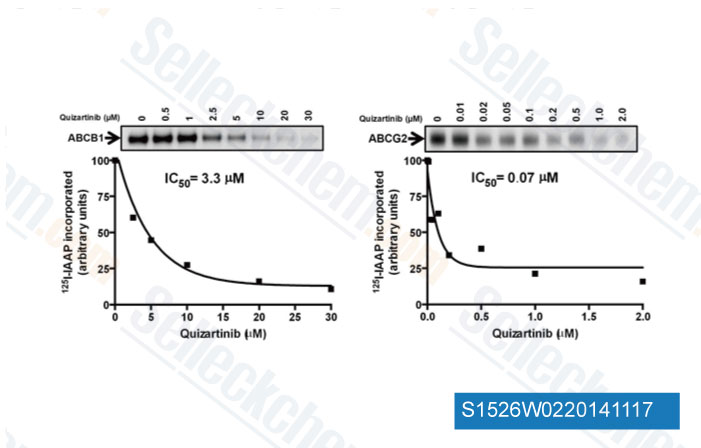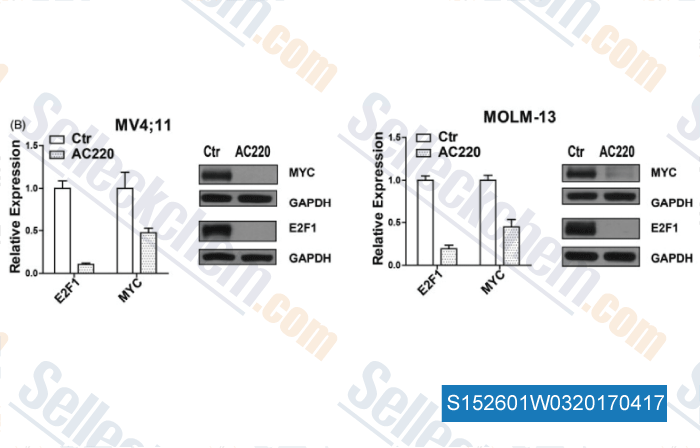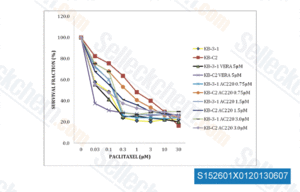|
Toll Free: (877) 796-6397 -- USA and Canada only -- |
Fax: +1-832-582-8590 Orders: +1-832-582-8158 |
Tech Support: +1-832-582-8158 Ext:3 Please provide your Order Number in the email. |
Technical Data
| Formula | C29H32N6O4S |
|||
| Molecular Weight | 560.67 | CAS No. | 950769-58-1 | |
| Solubility (25°C)* | In vitro | DMSO | 100 mg/mL (178.35 mM) | |
| Water | Insoluble | |||
| Ethanol | Insoluble | |||
|
* <1 mg/ml means slightly soluble or insoluble. * Please note that Selleck tests the solubility of all compounds in-house, and the actual solubility may differ slightly from published values. This is normal and is due to slight batch-to-batch variations. * Room temperature shipping (Stability testing shows this product can be shipped without any cooling measures.) |
||||
Preparing Stock Solutions
Biological Activity
| Description | Quizartinib (AC220) is a second-generation FLT3 inhibitor for Flt3(ITD/WT) with IC50 of 1.1 nM/4.2 nM in MV4-11 and RS4;11 cells, respectively, 10-fold more selective for Flt3 than KIT, PDGFRα, PDGFRβ, RET, and CSF-1R. Quizartinib (AC220) induces apoptosis of tumor cells. Phase 3. | ||||
|---|---|---|---|---|---|
| Targets |
|
||||
| In vitro | AC220, a unique, potent and selective inhibitor of FLT3, has high affinity for FLT3 with a Kd value of 1.6 nM. AC220 inhibits the autophosphorylation of FLT3 in the human leukemia cell lines MV4-11 which harbor a homozygous FLT3-ITD mutation and is FLT3 dependent, and RS4;11 which expresses wild-type FLT3 with IC50 values of 1.1 nM and 4.2 nM, respectively. AC220 is the most potent cellular FLT3-ITD inhibitor, leading to the most significant inhibition of MV4-11 cell proliferation with IC50 of 0.56 nM compared to all other FLT3 inhibitors whose IC50 values range from 0.87 nM to 64 nM. AC220 has no inhibitory activity against the proliferation of A375 cells which harbor an activating mutation in BRAF and are not FLT3 dependent, indicating a large window between FLT3 inhibition and general cytotoxic effects. [1] | ||||
| In vivo | Oral administration of AC220 (10 mg/kg) induces time-dependent inhibition of FLT3 autophosphorylation in the FLT3-ITD–dependent MV4-11 tumor xenograft mouse model; the inhibition being 90% at 2 hours and 40% at 24 hours. AC220 significantly extends survival in a mouse model of FLT3-ITD AML with doses as low as 1 mg/kg given orally once a day. Treatment with AC220 at 10 mg/kg for 28 days results in rapid and complete regression of tumors in all mice with no tumor regrowth during the 60-day posttreatment period. AC220 displays more significant efficacy compared to sunitinib treatment which causes tumors to shrink slowly and resume growth immediately upon discontinuation of treatment in all but one of the mice. [1] | ||||
| Features | The most potent cellular FLT3-ITD inhibitor. |
Protocol (from reference)
| Kinase Assay:[1] |
|
|---|---|
| Cell Assay:[1] |
|
| Animal Study:[1] |
|
Customer Product Validation

-
Data from [Data independently produced by Mol Cancer Ther, 2014, 13(10), 2315-27]

-
Data from [Data independently produced by PLoS One, 2013, 8(8), e71266]

-
, , Leuk Lymphoma, 2017, 58(10):2426-2438

-
,
Selleck's Quizartinib (AC220) has been cited by 155 publications
| FLT3 inhibitors induce p53 instability, driven by STAT5/MDM2/p53 competitive interactions in acute myeloid leukemia [ Cancer Lett, 2025, 611:217446] | PubMed: 39756787 |
| Inhibition of NLRP3 enhances pro-apoptotic effects of FLT3 inhibition in AML [ Cell Commun Signal, 2025, 23(1):53] | PubMed: 39875995 |
| Conventional type 1 dendritic cells in the lymph nodes aggravate neuroinflammation after spinal cord injury by promoting CD8+ T cell expansion [ Mol Med, 2025, 31(1):37] | PubMed: 39901071 |
| Targeting Ras-, Rho-, and Rab-family GTPases via a conserved cryptic pocket [ Cell, 2024, S0092-8674(24)00908-5] | PubMed: 39255801 |
| Mapping the proteogenomic landscape enables prediction of drug response in acute myeloid leukemia [ Cell Rep Med, 2024, 5(1):101359] | PubMed: 38232702 |
| RSK1 dependency in FLT3-ITD acute myeloid leukemia [ Blood Cancer J, 2024, 14(1):207] | PubMed: 39592591 |
| The Immunomodulatory Effect of Different FLT3 Inhibitors on Dendritic Cells [ Cancers (Basel), 2024, 16(21)3719] | PubMed: 39518156 |
| Targeting FLT3-TAZ signaling to suppress drug resistance in blast phase chronic myeloid leukemia [ Mol Cancer, 2023, 10.1186/s12943-023-01837-4] | PubMed: 37932786 |
| Targeting FLT3 with a new-generation antibody-drug conjugate in combination with kinase inhibitors for treatment of AML [ Blood, 2023, 141(9):1023-1035] | PubMed: 35981498 |
| A combinatorial therapeutic approach to enhance FLT3-ITD AML treatment [ Cell Rep Med, 2023, 10.1016/j.xcrm.2023.101286] | PubMed: 37951217 |
RETURN POLICY
Selleck Chemical’s Unconditional Return Policy ensures a smooth online shopping experience for our customers. If you are in any way unsatisfied with your purchase, you may return any item(s) within 7 days of receiving it. In the event of product quality issues, either protocol related or product related problems, you may return any item(s) within 365 days from the original purchase date. Please follow the instructions below when returning products.
SHIPPING AND STORAGE
Selleck products are transported at room temperature. If you receive the product at room temperature, please rest assured, the Selleck Quality Inspection Department has conducted experiments to verify that the normal temperature placement of one month will not affect the biological activity of powder products. After collecting, please store the product according to the requirements described in the datasheet. Most Selleck products are stable under the recommended conditions.
NOT FOR HUMAN, VETERINARY DIAGNOSTIC OR THERAPEUTIC USE.
